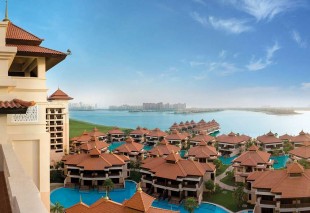

In-depth: The rejection of hotel residences

Omniyat’s decision to re-launch two stalled residential developments as hotel projects highlights a growing investment trend across the United Arab Emirates
Dubai developer Omniyat has re-launched two of its previously stalled Business Bay residential developments as hotel projects in what the company’s executive chairman and CEO describes as a ‘significant value increase’.
Speaking ahead of the recent Global Cityscape trade event, Omniyat executive chairman and CEO Mahdi Amjad described plans for the developer to shift away from residential-only developments to more diverse and, it believes, lucrative hotel-residential projects.
“It increases the value at least 30- 40% for the owners who have previously purchased, and effectively brings by far a better product to the market,” explained Amjad.
The first of the two projects is The Opus, which will be a revamp of the 23-storey retail and commercial tower it launched in 2008, which will now also comprise a five-star, mixed-use hotel and apartment development.
Amjad said the new Opus development is to be designed by Iraqi-British architect, Dame Zaha Hadid, the first hotel and apartment project to her name, with the hotel to be managed by the ME by Melia hotel brand, owned by Spain’s Melia Hotels Group.
Omniyat’s second project, The Pad, is also a reincarnation of the company’s 2007 development of the same name, comprising a 231-apartment, 24-storey tower that was originally due for completion in 2009.
Amjad said the new development would be “a very cool, hip hotel” and hoped it would be finished in mid-2015 as the first of a chain of properties under the brand, The Pad.
The move by Omniyat appears to mirror a growing trend for developers and investors to use the strong recent performance of Dubai’s hospitality market to maximise return on investment for upcoming, as well as existing, developments.
According to STR Global, Dubai hotel’s RevPar increased by 15.5% to AED552.50 ($150) for September compared to the previous year, which appears to be the driving force behind the recent decision by the Media Rotana Dubai hotel to convert its apartment tower into more hotel rooms, in a move that will increase its current 460 keys to a total of 540 by the middle of next year.
Speaking after the decision was made, general manager Rabih Melhem revealed that due to the hotel’s location in Dubai’s Tecom area, and the hotel’s typical target market of short term business travellers, increasing the number of hotel rooms became the most financially viable option.
“We believe as a five-star hotel located in this area, there is high demand for hotel rooms vs. hotel apartments, especially with the area being surrounded with a lot of hotel apartments it’s a bit of a challenge for us to compete,” explained Melhem.
Article continues on next page ...
Clever Condos
Another company looking to benefit from the hospitality boom is SKAI Holdings, which recently recorded sales worth AED2.4bn ($653m) following the launch of its AED3.67bn ($1bn) Viceroy Dubai Palm Jumeirah development in May.
The firm, which partnered with Viceroy Hotels and Resorts, announced it had sold 470 hotel rooms and hotel apartments and 219 residential apartments and villas to date in a freehold sales model, which allows investors to lease back their room to the hotel and earn revenue on its use, which SKAI estimates will offer an annual rate of return estimated at 12%.
“Investors have been extremely keen to purchase property in this exciting new project... buyers have been particularly interested in purchasing the hotel rooms, which is a unique business model here in the UAE,” said SKAI Holding chief executive officer Kabir Mulchandani.
Dubai-based developer Seven Tides is also receiving increasing interest from investors for its Anantara Residences Dubai project, which forms a part of the Anantara Dubai The Palm Resort and Spa on the Palm Jumeirah.
The project comprises 442 fully furnished one and two-bedroom apartments, as well as a limited number of penthouses, which are designed to be a more attractive investment opportunity than a traditional residential development would be in the same location.
“The starting price for a one-bedroom apartment is AED2.4 million (US $654,000). In comparison a Palm Jumeirah Shoreline apartment of similar size is on the market for AED2.2 million ($599,000). But in terms of financials that is where any similarity ends,” commented Seven Tides CEO Abdulla Bin Sulayem.
According to Seven Tides’ announcement, a hotel room (or residence with access to five-star resort hotel facilities) could generate as much as AED 190,200 ($51,797), almost double the AED 100,000 ($27,233) annual rent a Palm shoreline apartment realises.
“Anantara is a luxury five-star resort and as such would attract room rates at the top end of the scale. Many investors are now looking for the flexibility to generate supplementary income by leasing their apartments when they are not in Dubai” commented Bin Sulayem.
Article continues on next page ...
The Story in Short
Dubai developer Omniyat is to re-launch two stalled Dubai tower developments as new hotel-residential projects in order to boost revenue. One of the company’s rebranded towers, The Opus, was originally launched in 2008 as a 23-storey retail and commercial tower that was slated to be finished in 2010, but the project will now include a five-star, mixed-use hotel and apartment development.
The tower is to be designed by Iraqi-British architect Dame Zaha Hadid, her first hotel and apartment project, with the hotel set to debut the ME hotel brand, owned by Spain’s Melia hotels group, in the region.
The second project is also a reincarnation of a 2007 development, which originally comprised a 231-apartment, 24-storey tower in Business Bay, and will now become The Pad hotel and is due to be completed by mid-2015 as the first of a chain of proposed hotel properties.